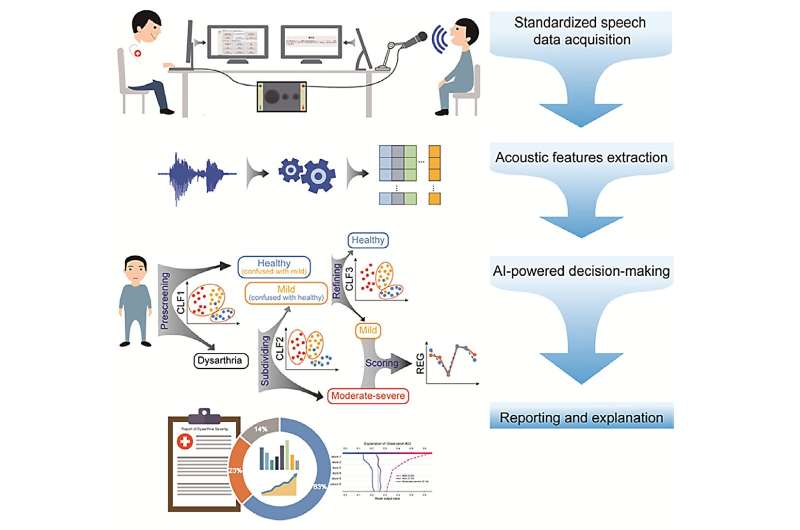This article has been reviewed according to Science X's editorial process and policies. Editors have highlighted the following attributes while ensuring the content's credibility:
fact-checked
trusted source
proofread
Studies show potential of AI-powered language assessment for cognitive and motor disorders

A research team led by Prof. Li Hai from the Hefei Institutes of Physical Science of the Chinese Academy of Sciences has completed their research in the field of artificial intelligence (AI)-powered language assessment for cognitive and motor disorders in a series of papers.
Acoustic and linguistic features in speech are sensitive markers of brain disorders and aging, enabling automated cognitive assessment of speech.
In their study, the researchers developed an AI-based speech assessment system that used acoustic and linguistic features in speech to automatically assess cognitive abilities. This system included a standardized computerized speech task battery commonly used in clinical settings, a machine learning module, and an automated scoring and reporting system.
The researchers conducted a comprehensive investigation of the reliability of the speech task battery across seven cognitive tasks and about one hundred speech acoustic features. This study provides crucial data support for feature engineering.
To address the methodological challenge of assessing the reliability of online tests, they also refined a split-half reliability estimation method.
The clinical efficacy of the AI-based speech assessment system was validated using a valuable sample of individuals with Wilson Disease, which served as an ideal disease model with mixed dysarthria phenotypes.
The researchers demonstrated the superior performance of their model in predicting dysarthria severity. Their systematic methodological framework provided valuable insights into AI-driven intelligent diagnosis, rehabilitation, and home support for neurological diseases.
In addition, they explored the feasibility of automated assessment for cognitive disorders, including dementia. They examined the role of automatic speech recognition (ASR) in dementia detection and verified the effectiveness of an end-to-end prediction model for dementia detection based on different commercial ASR tools.
The series of research advances highlight the interdisciplinary collaboration among computer scientists, neurology clinicians, and cognitive psychologists, establishing a promising model for translational medicine.
The research is published in Advanced Intelligent Systems, Behavior Research Methods, Dementia and Geriatric Cognitive Disorders and Computer Speech & Language.
More information: Zhenglin Zhang et al, Artificial Intelligence‐Powered Acoustic Analysis System for Dysarthria Severity Assessment, Advanced Intelligent Systems (2023). DOI: 10.1002/aisy.202300097
Zhengkang Zhang et al, Split-half reliability estimates of an online card sorting task in a community sample of young and elderly adults, Behavior Research Methods (2023). DOI: 10.3758/s13428-023-02104-6
Lijuan Tang et al, Explainable Alzheimer's Disease Detection Using Linguistic Features from Automatic Speech Recognition, Dementia and Geriatric Cognitive Disorders (2023). DOI: 10.1159/000531818
Feifan Feng et al, Test-retest reliability of acoustic and linguistic measures of speech tasks, Computer Speech & Language (2023). DOI: 10.1016/j.csl.2023.101547


















